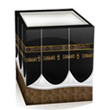Women wearing perfume and leaving the house.
- Details
- Category: Sheikh Bin Baz
- Published on Wednesday, 06 November 2013 10:46
- Hits: 672
Women wearing perfume and leaving the house.
Question:
Is it permissible for the woman when she wants to go to school or hospital or visit the relatives and the neighbours, that she perfumes herself and exits?
Answer:
Perfume is permissible for her if her leaving is to a womens gathering, and she will not pass in the path of the men. As for her leaving out perfumed to the markets in which there are men, then this is not permissible due to the statement of the prophet sallahu alayhi wassalm
'whichever woman has applied perfume then let her not witness with us the isha'
And due to other ahadeeth narrated in this regard, because her leaving out perfumed in the path of men and the gatherings of men, like the masaajid (mosques) is from the means of fitnah being caused by her. Just as it is obligatory upon her to veil and to be on ones guard against tabarruj (displaying ones beauty) due to the statement of the exalted and the most high:
And stay in your houses, and do not display yourselves like that of the times of ignorance..(Al-Ahzab 33:33)
and from tabarruj (displaying ones beauty) is manifesting the charming qualities and the beauties, like the face and the head and other then them.
Shaykh `Abdul-`Azeez Bin Baz
Translated by Umm Mujaahid bint Abdul Khaaliq ibn Muhammad fadl





















